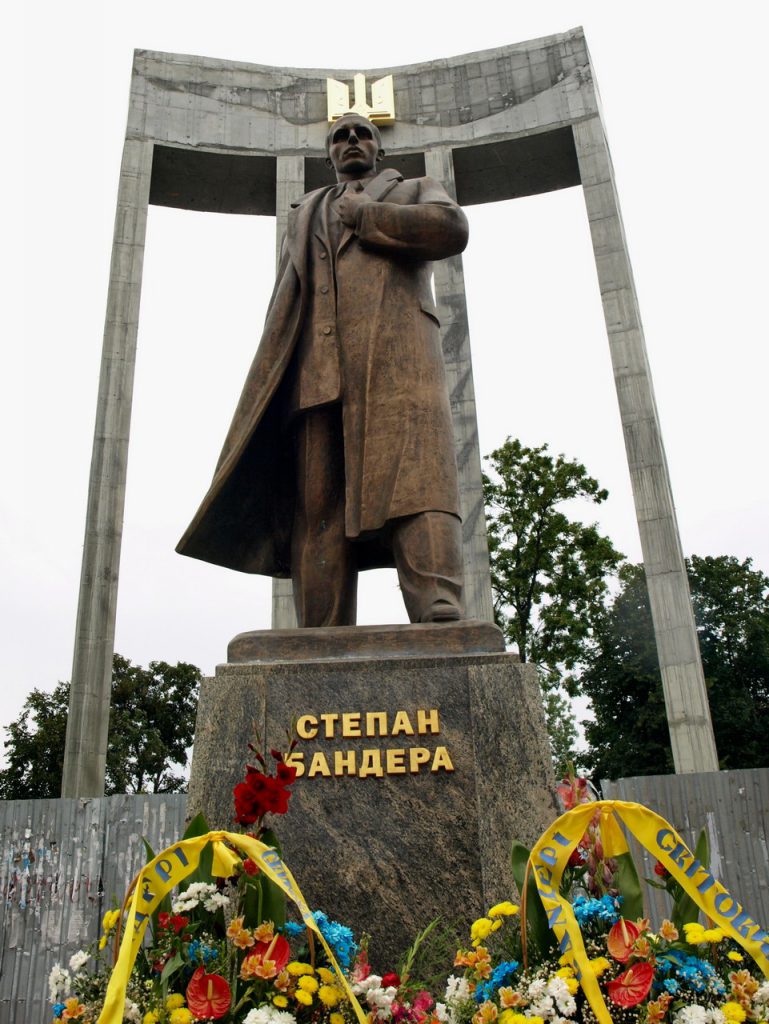On 7 of July 2016 the Kyiv City council decided to change the name of the “Moscow Avenue” to Stepan Bandera Avenue. Bandera was a Ukrainian nationalist leader who fought to establish an independent Ukraine before and during the World War II, although without abstaining from collaboration with Nazis forces. This decision was taken almost unanimously, with 87 of the 97 members of the City council voting in its favor.
Incidentally, as reported by Radio Free Europe, this was not the only change approved on that occasion. Two streets named after Russian military officials were renamed after two prominent Ukrainian figures. Remarkably, another street name might also eventually be changed, this time after a contemporary Russian opposition hero: the Mayor of Kyiv Vitali Klitschko reportedly proposed renaming Povitroflotskyi Prospect after Boris Nemtsov, an outspoken critic of the Russian President Vladimir Putin, who was assassinated on 27 February 2015, while organizing a mass protest in opposition to the Russian aggression against Ukraine and Putin’s economic policies. The Russian embassy is located in Povitroflotskyi Prospect.
In elaborating on Bandera’s rehabilitation in a brief article whose self-explanatory title is “Collaborator. No longer a dirty word?”, Gareth Pritchard and Desislava Gancheva, from the University of Adelaide, frame this pivotal event in a broader perspective, namely the emergence of a new wave of legitimization for wartime collaborators all over Europe. This legitimization is justified in a sweetened version of national history spread by ruling authorities. These researchers effectively summarize this process thus: “At the heart of all nationalisms are national narratives: collective stories about how the nation came into being and what the nation has accomplished.”
Indeed, renaming streets after national heroes seems is only a Lilliputian example of the Ukrainian government’s manifest eagerness to shape national collective memory. The Ukrainian Institute of National Remembrance, established in May 2006, maintains a dedicated website (www.memory.gov.ua) which promotes the official version of Ukrainian history. The dekomunizatsiya ambitions of this top-down cultural operation are explicitly stated. The tragedy of Holodomor, for instance, is labelled as a “communist genocide”, an unpunished slaughter which was witnessed by people of the Truth. As in the Bandera case, the processes of decommunization and derussification go hand in hand. To an external observer, the semantic shift from “Soviets”, old occupiers, to “Russians”, today’s invaders, seems at least suggested.
We witnessed this process of distancing from Russia during our study trip in Ukraine, where we heard the former soldier and current politician Nadia Savchenko speak about fighting “Asian values” in referring to Russia, as if Ukraine was completely European and Russia was not, as well as Professor Volodymyr Paniotto’s claim that Russians and Ukrainians do not share the same “ethnos” [sic].
These tendencies can be seen elsewhere in post-Communist Europe. Exactly two weeks after the decision by the Kyiv City council, another political decision raised the issue of contended memories. On 22 July 2016, the Polish Parliament by a margin of 432 to 10 votes officially classified as a genocide the Volyn Massacre, the slaughter of at least 70,000 Poles committed in Nazi-occupied Poland by the Bandera’s Ukrainian Insurgent Army (UPA) in 1943-1944. Claiming a memory of genocide, especially when it has been forcibly denied or diminished, is instrumental for eliciting a nationalist identity against the political and national heirs of the murderers. A similar process occurred in former Yugoslavia, where, with the collapse of the multi-ethnic state, resurgent memories of the reciprocal murders perpetrated during the World War II fueled the war between Croatia, Serbia and Bosnia. Paradoxically maybe, even the decision of the Polish Parliament may be reshaped not in an anti-Ukrainian, but in an anti-Russian move useful to strengthen both Polish and Ukrainian nationalist belonging. According to Ukraine Today, Polish Defense Minister Antoni Macierewicz is said to have blamed Soviet Russia for having indirectly supported the massacre.
Given that thousands of significant acts of violence or heroism have occurred in every country in the past, governments are able to select freely which ones serve their political aims the most. Evil deeds committed by one’s own nationals have to be equated with equally lamentable acts carried out by others (the idea that atrocities were committed by both parties), whereas some specific fragments of history need to be labelled as exceptionally painful for the nation. These inhuman deeds have to be narrated as “extraordinary” in the literal Latin meaning of something ‘out of the ordinary, unconceivable, a grief that the community cannot neither forget nor forgive, unless risking to offend the spilled blood. In contemporary Ukraine nobody embodies this effort of nationalist story-telling more than Volodymyr Viatrovich, a historian who, according to Foreign Policy, “is erasing the country’s racist and bloody history — stripping pogroms and ethnic cleansing from the official archives” by portraying the recent history of Ukraine in a whitewashing manner to please the most nationalist wings of Ukrainian society.
History is rarely a matter of the past, but nearly always a matter of the present. In today’s Europe many governments are passionately engaging in rewriting national pasts, in inventing new traditions, in rediscovering old values and mores, as examplified by Viktor Orban’s statements during the commemoration for the 50th anniversary of the Hungarian Revolution. Interpreting history as a matter of the present, hence, means seeing it as a matter of power as well. “He who controls the present controls the past. He who controls the past controls the future”, George Orwell wrote.

